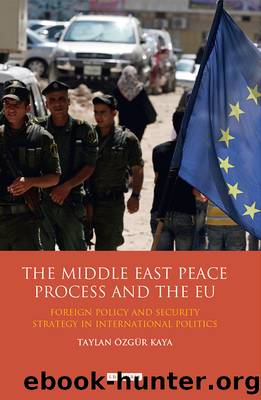The Middle East Peace Process and the EU by Taylan Özgür Kaya

Author:Taylan Özgür Kaya [Kaya, Taylan Özgür]
Language: eng
Format: epub
Tags: History, Middle East, General, Political Science, International Relations
ISBN: 9781786734983
Google: dnb3DwAAQBAJ
Publisher: Bloomsbury Publishing
Published: 2012-12-20T01:12:00+00:00
Table 5.1 EUâs financial support for the Palestinians during the period between 2001 and 2006
Source: http://ec.europa.eu/external_relations/palestinian_authority/index_en.htm
The EUâs financial and technical aid to the Palestinian Authority made significant contributions to the survival of the MEPP. First of all, this aid prevented the Palestinian Authority from financial collapse; without this aid the Palestinian Authority would not have been able to finance even the basic functions of governance. The prevention of the collapse of the Palestinian Authority facilitated the continuation of the peace process, because the collapse of the Palestinian Authority might have resulted in the escalation of conflict and the interruption of the peace process. Secondly, this aid enabled the Palestinian Authority to fulfil its obligations under the Roadmap. The EU through its aid has laid the ground for the creation of an independent, economically and politically viable, sovereign and democratic Palestinian State. An EU official put forward the opinion that creating a functioning Palestinian State was the EUâs way of facilitating the peace process.27
The first component of the EUâs aid to the Palestinian Authority, direct budgetary support, helped the Palestinian Authority to alleviate and offset the disastrous consequences of the fiscal crisis caused by Israelâs withholding of the Palestinian tax and custom revenues it had collected on behalf of the Palestinian Authority following the outbreak of the Al-Aqsa Intifada in September 2000 and the escalation of violence between the Israelis and the Palestinians. A Palestinian diplomat acknowledged that the EUâs aid prevented the Palestinian Authority from collapse and thereby enabling it to remain afloat.28 This aid enabled the Palestinian Authority to secure expenditures such as public service salaries, social, educational, health and core functions of the Palestinian Authority in the absence of regular monthly transfers of revenues from Israel to the Palestinian Authority. In Chris Pattenâs words, without the EUâs financial and technical aid âthere would have been no Palestinian interlocutor for the negotiations now under wayâ (Newman and Yacobi 2004a: 31). As a British diplomat suggested, by enabling service provision by the Palestinian Authority, the EUâs aid enabled the Palestinian Authority to maintain its legitimacy as a negotiating partner in the MEPP.29
As shown in Table 5.1, during the period between 2001 and 2006, the EU invested â¬428.25 million in the Palestinian Authority which constituted the highest percentage (26 per cent) of total aid directed to the Palestinians. The EU did not invest in any direct support to the Palestinian Authority in 2006. This is because the EU suspended direct budgetary support to the Hamas-led Palestinian government in March 2006 when the Hamas-led Palestinian government failed to meet and implement the three principles, the recognition of which the EU had made its future financial aid conditional on, which were non-violence including the laying down of arms, recognition of Israelâs right to exist and acceptance and fulfilment of existing agreements and obligations, including the Roadmap.
The second and third components of the EUâs aid to the Palestinians â support for the Palestinian infrastructure and institution building â were crucial for the creation of an independent, economically and politically viable, sovereign and democratic Palestinian State.
Download
This site does not store any files on its server. We only index and link to content provided by other sites. Please contact the content providers to delete copyright contents if any and email us, we'll remove relevant links or contents immediately.
The European Opportunity by Felipe Fernández-Armesto(571)
The European History Highway: A Guide to Internet Resources by Dennis A. Trinkle Scott A. Merriman(535)
Morgan Kaufmann Digital Watermarking and Steganography by Ingemar Cox Matthew Miller Jeffrey Bloom Jessica Fridrich Ton(529)
The Seven Wonders of the Ancient World by Michael Denis Higgins(521)
Hyperculture by Byung-Chul Han(511)
European Security without the Soviet Union by Stuart Croft Phil Williams(508)
European Security in a Global Context by Thierry Tardy(507)
The Routledge companion to Christian ethics by D. Stephen Long Rebekah L. Miles(499)
Get Real with Storytime by Julie Dietzel-Glair & Marianne Crandall Follis(444)
Hudud Al-'Alam 'The Regions of the World' - a Persian Geography 372 A.H. (982 AD) by V. V. Minorsky & C. E. Bosworth(439)
Tibetan Studies in Comparative Perspective by Chih-yu Shih Yu-Wen Chen(437)
Gorbachev And His Generals by William C. Green(429)
Governance, Growth and Global Leadership by Espen Moe(428)
CliffsNotes on Fitzgerald's The Great Gatsby by Kate Maurer(412)
How Languages Are Learned 5th Edition by Patsy M Lightbown;Nina Spada; & Nina Spada(408)
The Oxford History of the World by Fernández-Armesto Felipe;(388)
The Egyptian Economy, 1952-2000 by Khalid Ikram(387)
Oral Poetry and Narratives from Central Arabia: The Poetry of Ad-Dindan : A Bedouin Bard in Southern Najd (Studies in Arabic Literature, Vol 17) (English and Arabic Edition) by P. M. Kupershoek P. Marcel Kurpershoek(367)
The Oxford Handbook of the Incas by Sonia Alconini(365)
